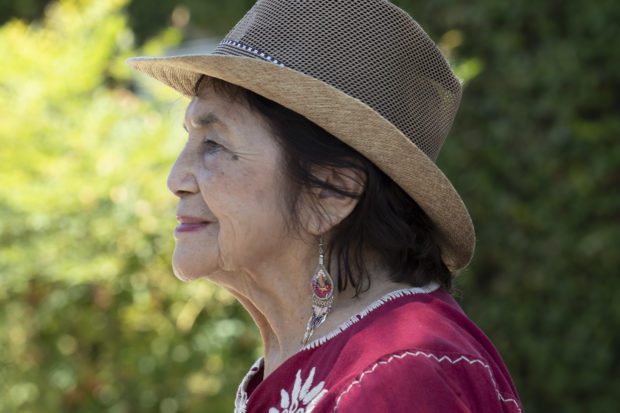
On April 10, civil rights icon Dolores Huerta turns 93. She keeps her indomitable energy and passion for social justice, women’s rights and more.
How is she going to celebrate? In Sacramento, she will meet with legislators, and in Los Angeles, she will attend an event at the Plaza de la Cultura. She will later be honored by the University of Southern California. Similar to a regular day in her life: traveling, attending conferences, talking to people, planning.
She keeps herself busy through her nonprofit organization, the Dolores Huerta Foundation (DHF; doloreshuerta.org).
“When I left the UFW, I wanted to go back to help people to help them to change their conditions,” said Huerta during a brief interview with the Community Alliance. She was inspired by the Community Service Organization (CSO), founded in 1947 by legendary organizer Fred Ross.
The CSO was a Latino civil rights organization. Huerta founded the Stockton chapter of the CSO in 1955. “[The] CSO was responsible for the election of the first Latino to the Los Angeles City Hall, Edward Royball, who later became the first Latino to get elected to the U.S. Congress,” explains Huerta.
She also mentions other achievements of the CSO such as the passing of legislation to allow residents to obtain their drivers’ licenses in Spanish, to get ballots and voting literature in their language, and to provide assistance to children—including immigrants.
Huerta was born Dolores Clara Fernandez in New Mexico to a Mexican immigrant family from whom she learned stories about labor organizing. She grew up in Stockton, where she attended high school and later graduated from San Joaquin Delta Community College.
Huerta is concerned about current social issues affecting our community. “Republicans are lying to our people on issues like abortion, homosexuality…I like to tell people, ‘Listen, I had 11 children, but none of my kids had that many children, and one of my daughters didn’t have any, and I respect her decision.’
“To have or not to have children is a woman’s decision, or a family’s decision. Same with who you live with. If you fall in love with a person of your same sex, that’s your business. It’s part of your rights; we can’t tell you what to do.”
Regarding immigration, a hot issue among immigrants, Huerta explains that many people come to her saying the country needs immigration reform. “And I ask them, ‘Are you voting?’”
The last immigration reform passed in 1986 through which approximately three million people became residents. Since then, Congress has failed to agree on a new immigration bill that could deal with the issue.
Some verbiage makes things more complicated, such as calling immigration bills a “path to citizenship,” suggesting that undocumented immigrants could easily become citizens. In fact, immigrants who qualify must first become “legal residents” and after five years they might qualify for U.S. citizenship.
“We can make bills to pass if we vote, if we are active…If we don’t, those who oppose immigration reform will continue to hold power,” says Huerta, who continually encourages people to register and vote.
Regarding the role of the DHF in current political affairs, Huerta explains that it was active during the last Census ensuring that people were counted and participated in local elections. She proudly mentions that the DHF helped more than 10,000 people get the Covid-19 vaccine. Currently, the DHF operates in five counties with headquarters in Bakersfield.
“We are also concerned about climate change,” says Huerta. “See what is happening now [with the floods]. We can make changes, but we have to work hard for it, and we have to get involved.”

